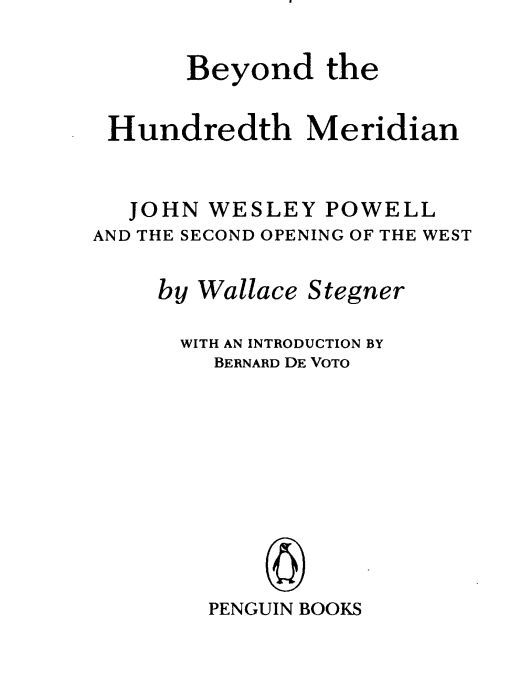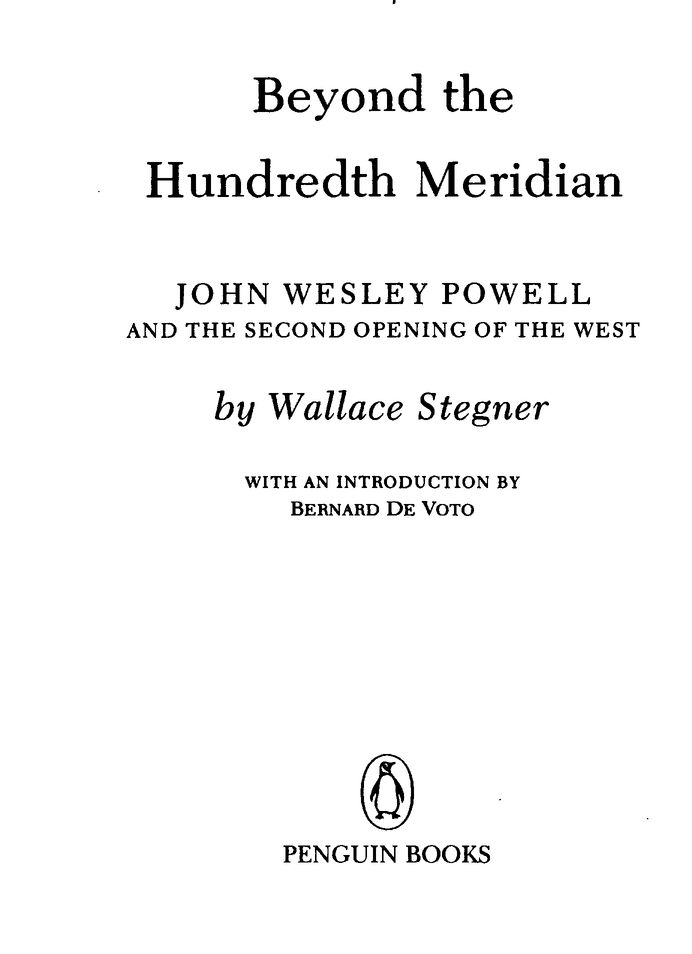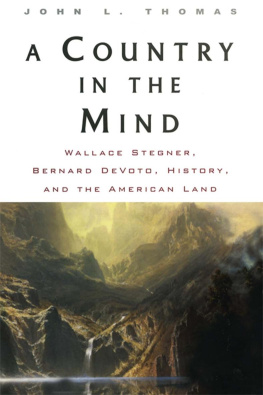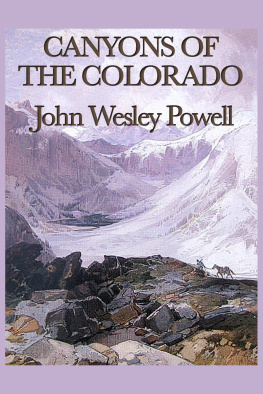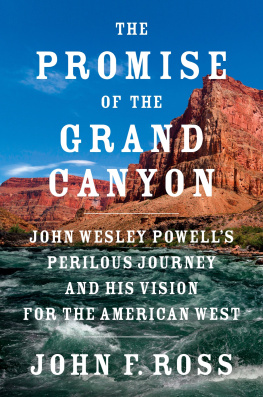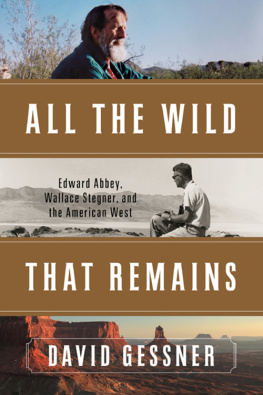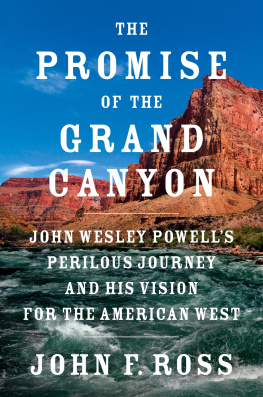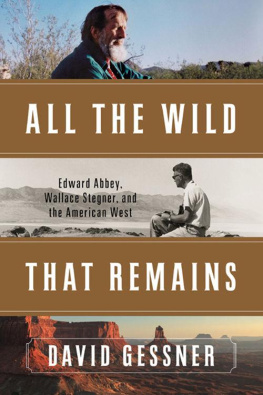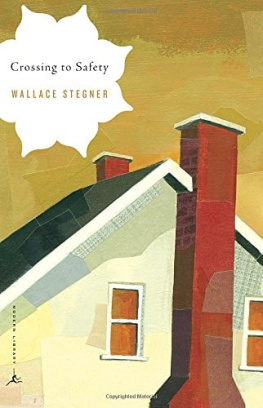Table of Contents
PENGUIN BOOKS
BEYOND THE HUNDREDTH MERIDIAN
Wallace Stegner (1909-1993) was the author of. among other novels, Remembering Laughter, 1937; The Big Rock Candy Mountain, 1943; Joe Hill, 1950; All the Little Live Things, 1967 (Commonwealth Club Gold Medal); A Shooting Star, 1961; Angle of Repose, 1971 (Pulitzer Prize, 1972); The Spectator Bird, 1976 (National Book Award, 1977); Recapitulation, 1979; and Crossing to Safety, 1987. His nonfiction includes Beyond the Hundredth Meridian, 1954; Wolf Willow, 1963; The Sound of Mountain Water (essays), 1969; The Uneasy Chair: A Biography of Bernard DeVoto, 1974; and Where the Bluebird Sings to the Lemonade Springs: Living and Writing in the West, 1992. Three of his short stories have won O. Henry prizes, and in 1980 he received the Robert Kirsch Award from the Los Angeles Times for his lifetime literary achievements. His Collected Stories was published in 1990. ,
For Bernard DeVoto
Dear Benny:
This is a book in the area of your vast competence, one that you might have written more appropriately and certainly more authoritatively than I. It is dedicated to you in gratitude for a hundred kindnesses, the latest of which is the present introduction, but the earliest of which goes back nearly twenty years. I could not omit a word of thanks for all this without feeling that I had neglected the most important as well as the most pleasurable step in the making of this biography.
AUTHORS NOTE
THIS BOOK is an attempt to write a biography that is the history not of a personality but of a career.
I am not interested in Major Powells personality, though that is generally considered the excuse for a biography, and though he was a man, by the testimony of those who worked with him and loved him and hated him, electric with energy and ideas. I am interested in him in other ways: As the personification of an ideal of public service that seems peculiarly a product of the American experience. As the source and mouthpiece of ideas three quarters of a century ahead of their possible fulfillment, yet rooted in that same American experience. As the father of government bureaus far-reaching in their own effects and influential in the models they provided for other and later government agencies. Above all, as a champion and an instrument of social understanding and social change. Like Lester Ward, his one-time employee and firm friend, Major Powell repudiated that reading of Darwinism which made man the pawn of evolutionary forces. In his view, man escaped the prison in which all other life was held, because he could apply intelligence and will to his environment and bend it.
In these pages I have dwelt somewhat long on an early and relatively unimportant, though adventurous, episode: the running of the Colorado River. I have done so because though Powells later activities were of much greater national importance, the river journey was symptom and symbol. Though some river rats will disagree with me, I have been able to conclude only that Powells party in 1869 survived by the exercise of observation, caution, intelligence, skill, planning in a word, Science. A man or a civilization could do the same. Major Powells attempts to impose order on whatever he touched, and especially on the development of the western states whose problems he knew as no one in his time knew them, are the real subject of this book.
His understanding of the West was not built on a dream or on the characteristic visions of his time, for on one side he was as practical as a plane table. The mythologies of the seventies and eighties had as little hold on him as the mythological tales of Hopi or Paiute: he knew all about the human habit of referring sense impressions to wrong causes and without verification. His faith in science was a faith in the ultimate ability of men to isolate true that is, verifiable causes for phenomena. Also, he knew a good deal about the human habit of distorting facts for personal gain, and he fought western land interests and their political hatchet-men for years, out of no motive but to see truth and science triumph and the greatest good come to the greatest number over the greatest period of time, according to the American gospels.
More clearly than most of his contemporaries he demonstrated that fundamental affinity between Democracy and Science that made America after the Civil War, in spite of scandal and graft and unprecedented venality, one of the exciting and climactic chapters of history both intellectual and social. He was one of those who in his education and in his confirmed beliefs seemed the culmination of an American type, though his own family arrived in America barely in time for him to be born here.
Also, he was one of the illustrious obscure who within the framework of government science achieved unusual power. He did much solid good because he combined with personal probity an ability to deal with politicians. And if he was more optimistic about the future of America and the world than is now fashionable, a review of his career reveals that a large amount of his work both for science and for democracy has not only lasted but has generated more of the same. We have gone a good long way toward his principal recommendations with regard to the West; three generations after some of those plans were first proposed, they seem of an extraordinary prescience.
All of which is to say that though someone like Clarence King may warrant a biography because of his personality, his wit, the brilliance of his conversation and the glitter of his circle, Powells effect upon his country was that of an agent, or even of an agency. I have tried to treat him accordingly.
In the preparation of this biography I have benefited from the help and advice of scores of individuals and organizations. Some of the work has been done under grants from the Milton Fund of Harvard University, the Henry E. Huntington Library and Art Gallery, and the John Simon Guggenheim Memorial Foundation. The American Philosophical Society has kindly helped with microfilm problems. Among librarians I have yet to find a surly or unhelpful individual: I think librarians will inherit the earth. And the list of those to whom I owe a debt of gratitude is appended here, not to form a cordon through which a reader has to break to get at Powell, but as an inducement: If such as these have been interested in him and his work, he must be worthy of attention.
For kindness and assistance of every sort, I am especially grateful to Bernard DeVoto of Cambridge, Massachusetts; Henry Nash Smith of the University of California; Dale L. Morgan of Salt Lake City; Francis Farquhar, George R. Stewart, Otis Marston, and Paul Taylor of Berkeley, California; William Culp Darrah of Gettysburg, Pennsylvania; Lindley Morris of Bloomington, Illinois; Charles Kelly of Fruita, Utah; J. C. Bryant, Superintendent of the Grand Canyon National Park; the late Norman Nevills of Mexican Hat, Utah; Professor Robert Taft of the University of Kansas; Beau mont Newhall of Eastman House, Rochester, New York; Ansel Adams of San Francisco; Paul and Frances Judge of Grand Teton National Park, Wyoming; Struthers and Katherine Burt of Three Rivers Ranch, Moran, Wyoming; Louise Peffer of the Stanford Food Research Institute; J. O. Kilmartin, Chief of the Map Information Service of the United States Geological Survey; Matthew Stirling, Paul Oehser, and Miss Mae Tucker of the Bureau of American Ethnology; Professors Ben Page, J. E. Williams, and the late Bailey Willis of Stanford University, and V. L. Vander Hoof, formerly of Stanford; Leroy Hafen of the Colorado Historical Society and Marguerite Sinclair of the Utah State Historical Society; Thomas Manning of Yale University; and by no means least, the staffs of the libraries where I have had the pleasure of working: Widener Library of Harvard University; Bancroft Library, University of California; the Stanford University Library and the Branner Geological Library, Stanford University; the Henry E. Huntington Library; the National Archives, the United States Geological Survey, and the Bureau of American Ethnology in Washington; the New York Public Library; and the McClean County Historical Society of Bloomington, Illinois.

